Why Your Workflow Isn’t Failing Where You Think It Is

Table of Contents
When a GitHub Actions workflow that had been working fine for months suddenly failed, I went down a familiar rabbit hole of false assumptions, vague errors, and misleading logs. This post details the troubleshooting journey, the kind that initially screams “runner environment change,” but ends in a quiet whisper: “your token expired.”
Failing Automation That Moved 🐛 Issues #
The automated GitHub Actions workflow intelligently managed bug-related issues by moving them to a dedicated “Bugs” column in the project management board.
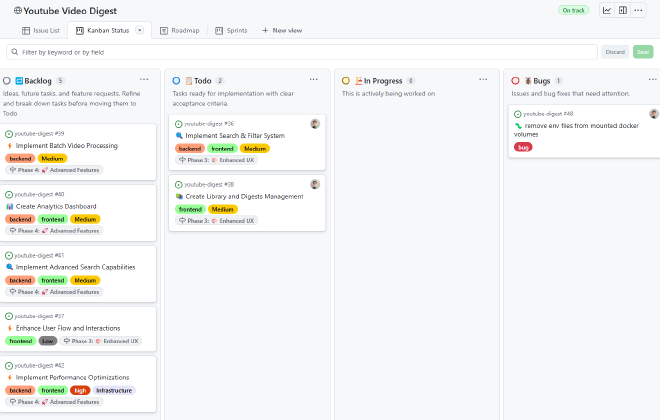
- Workflow Name: 🐛 Auto Bug Column Management
- Purpose: Move issues labeled
bugto a “Bugs” column in GitHub Projects - Tools: GitHub Actions,
ghCLI, shell scripting, PAT-based auth - Trigger Event: Issues labeled with
bug
- Purpose: Move issues labeled
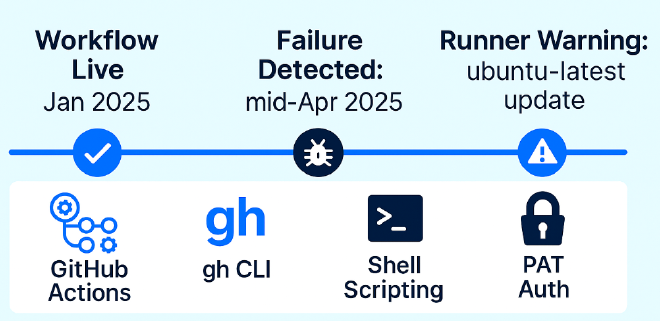
Initial Suspect: A Changing Environment #
Like many others, I use ubuntu-latest for my GitHub Actions runners for convenience. The timing was suspicious. Around the failure window, ubuntu-latest was shifting to ubuntu-24.04, and warnings started appearing in my logs. That seemed like the obvious issue—new OS, new CLI versions, maybe breaking changes.
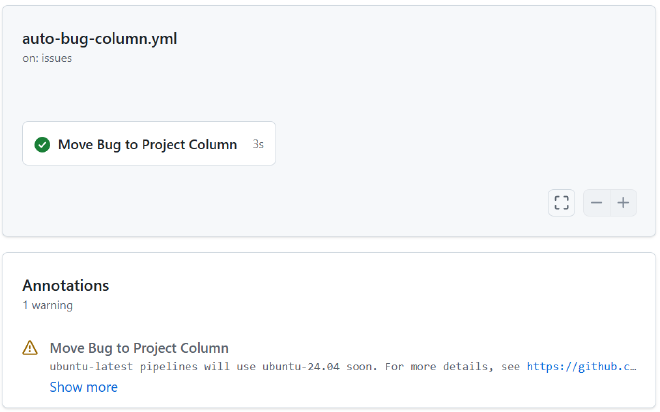
This seemed like the obvious culprit. Runner environment changes are a common source of workflow failures. I also checked the runner image software lists (like those tracked in actions/runner-images issues, e.g., #10636) and noted potential differences in pre-installed software, including the gh CLI version itself (my local gh 2.68.1 v.s. runner version 2.70.0).
My first logical step was to eliminate this variable by pinning the runner to ubuntu-22.04.
jobs:
move_bug_issues:
...
# runs-on: ubuntu-latest # Changed from this
runs-on: ubuntu-22.04 # To this
...
The result? No change. The failure persisted.
Hitting a 🧱: The Cryptic Error #
The crash point was a gh project item-list call meant to fetch the associated project card for the labeled issue.
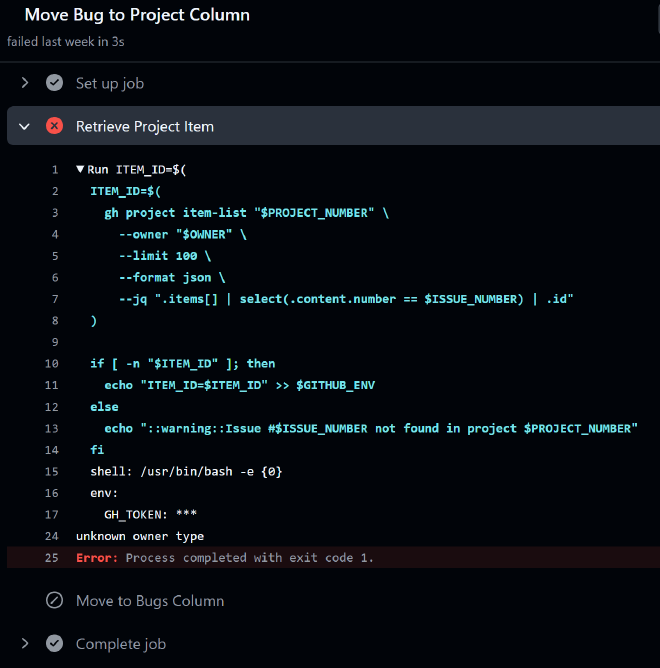
The error? unknown owner type with exit code 1.
Eliminating Environment Variables #
This wasn’t an obvious environment problem, and it didn’t look like a CLI version incompatibility. I checked anyway:
- Local
gh 2.68.1: ✅ Worked - Upgraded local
gh 2.71.1: ✅ Still worked - Actions runner: ❌ Failed
Environment inconsistencies were ruled out. Something about the Actions environment was off.
Refocusing: Authentication in CI/CD #
My workflow uses a Personal Access Token (PAT) stored as a secret (secrets.PROJECT_TOKEN) to authenticate gh commands, allowing it to modify my project board. Although I knew the PAT should be valid (it hadn’t been changed recently), the next logical step was to explicitly verify authentication within the runner environment.
I added a simple debug command to the failing step: gh auth status.
- name: Retrieve Project Item
id: get-item
run: |
echo "gh cli version: $(gh --version)"
echo "Checking auth status:"
gh auth status
# Original command follows...
ITEM_ID=$(
gh project item-list "$PROJECT_NUMBER" ...
)
...
env:
GH_TOKEN: ${{ secrets.PROJECT_TOKEN }}
The Real Culprit 🧨 #
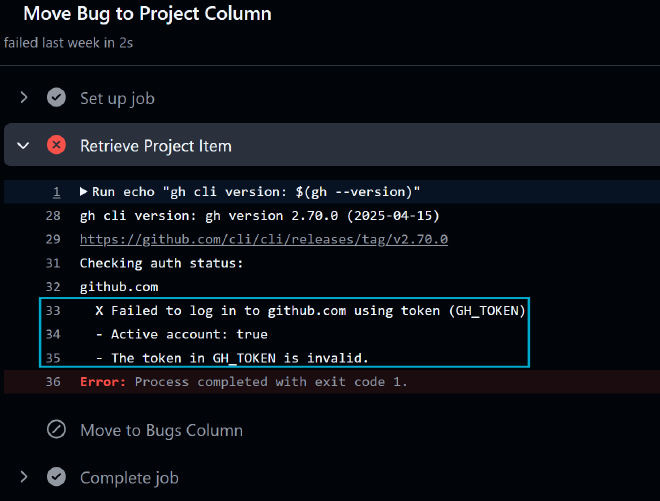
The unknown owner type error was simply a downstream effect of gh failing to authenticate properly before it could even process the project and owner details.
Root Cause: An Expired PAT 🔐 #
The PAT used in PROJECT_TOKEN had simply expired. GitHub’s UI still showed “last updated 4 months ago,” which was misleading– this reflects when the secret was added, not the PAT’s expiration.

PATs are generated with specific lifetimes (e.g., 30, 60, 90 days, or custom). It was almost certain my PAT, likely created with a 90-day expiry, had simply expired.
The Resolution: A Simple Token Refresh #
The fix was straightforward:
- Go to GitHub Developer Settings -> Personal access tokens.
- Find the relevant (likely expired) token.
- Regenerate the token, ensuring it had the necessary
projectscopes. I chose a new 90-day expiration. - Copy the new token value.
- Go back to the
youtube-digestrepository Settings -> Secrets and variables -> Actions. - Update the
PROJECT_TOKENsecret with the new token value.
After updating the secret, I re-ran the workflow, and it functioned as designed.
🧭 Lessons Learned #
This half-day troubleshooting journey reinforced several key points:
- Debug Systematically: Don’t get locked onto the first hypothesis, even if initial evidence seems strong (like runner update warnings). Methodically eliminate variables.
- Test Locally + Remotely: Validate CLI commands across both local and CI environments to isolate failure context.
- Verify Authentication Early: When CI/CD tools interact with APIs, especially if encountering strange errors, explicitly check the authentication status (
gh auth statusin this case) early in the debugging process. - Error Messages Can Mislead: The initial
unknown owner typeerror sent me down the wrong path initially. The real error was hidden until authentication was explicitly checked. - Manage Credential Lifecycles: PATs expire! This incident highlighted the need for proactive management. Setting calendar reminders or documenting expiration dates is crucial, even for solo projects.
Final Thoughts 💭 #
This wasn’t a code issue. It wasn’t a config mistake. It was an invisible clock on an auth token—masked by a misleading error. Sharing this isn’t just about fixing a one-off 🐛 bug. It’s about how to think like a debugger in CI/CD land, where context is everything and logs don’t always tell the truth.
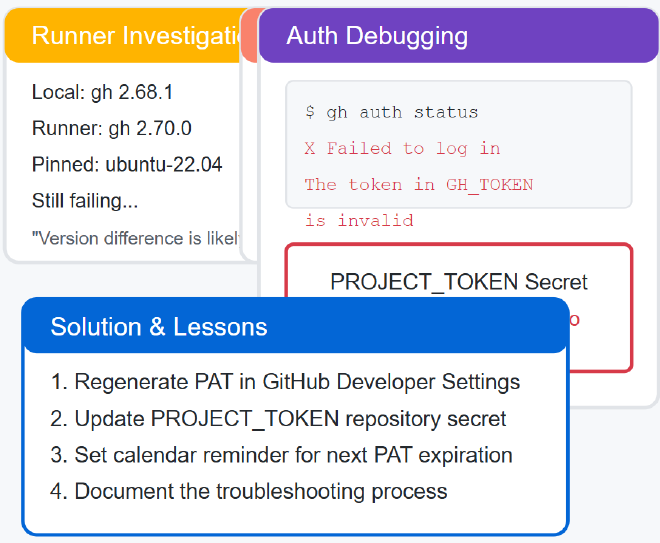
Hopefully, this helps someone else avoid losing half a day chasing ghosts.
Feel free to check out the 👇 workflow file if you’re curious how it’s wired.